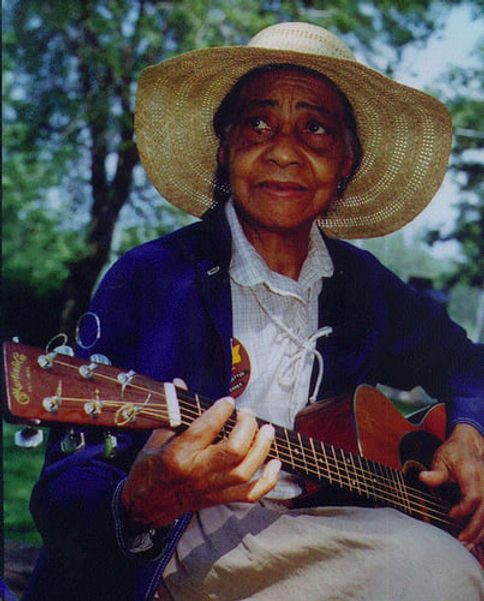By Jordan Meadows
Staff Writer
Elizabeth "Libba" Cotten, born Elizabeth Nevills on January 5, 1893, in Carrboro, North Carolina, emerged as one of the most influential figures in American folk and blues music.
A self-taught, left-handed guitarist, Cotten developed a singular playing style by flipping a right-handed guitar upside down, creating a distinctive technique in which her thumb played the melody and her fingers plucked the bass strings. This unique fingerpicking method became known as "Cotten picking," and it helped define a musical legacy that continues to reverberate across genres.
 Growing up in a working-class family, Cotten was the youngest of five children. By the age of eight, she was already playing music, borrowing her brother's banjo despite being forbidden to do so. Her first guitar, a $3.75 Sears and Roebuck model, was purchased with money she had saved while working as a domestic servant, earning just $1 a month.
Growing up in a working-class family, Cotten was the youngest of five children. By the age of eight, she was already playing music, borrowing her brother's banjo despite being forbidden to do so. Her first guitar, a $3.75 Sears and Roebuck model, was purchased with money she had saved while working as a domestic servant, earning just $1 a month.
She taught herself to play it in secret, eventually writing songs and mastering a large repertoire of rags and dance tunes. Her most famous composition, "Freight Train," was written in her early teens and was inspired by the sound of trains near her childhood home.
At 17, Cotten married Frank Cotten and soon after gave up playing music for family and church life. The couple had one daughter, Lillie, and spent many years moving between North Carolina, New York City, and Washington, D.C.
A pivotal moment in her story occurred when she helped a lost child, Peggy Seeger, find her mother, the composer Ruth Crawford Seeger, in a department store. This act led to her employment as a housekeeper for the Seegers, who would later help reintroduce Cotten to music.
Rediscovered in her 60s after decades away from performing, Cotten began playing again, first for the Seeger children and then for wider audiences. Mike Seeger recorded her in the late 1950s, resulting in the landmark album Folksongs and Instrumentals with Guitar (1958). The album, which featured "Freight Train," was later recognized by the Library of Congress and added to the National Recording Registry for its cultural, historical, and aesthetic significance.
The recording brought Cotten late-life acclaim. She toured widely, appearing at prestigious venues and festivals such as the Newport and Philadelphia Folk Festivals, and performed for audiences that included members of Congress and even the Kennedy family.
Her music became a cornerstone of the 1960s folk revival, and her songs were covered by legends such as Bob Dylan, Joan Baez, and Jerry Garcia. The British skiffle movement was also influenced by her work, especially when "Freight Train" was misappropriated and recorded by Chas McDevitt and Nancy Whiskey—ironically helping to spark a youth music movement that included future Beatles members. Thanks to the advocacy of the Seegers, her rights to the song were eventually restored.
Cotten’s achievements were recognized with numerous accolades in her later years. She won a Grammy Award in 1985 at the age of 90 for Elizabeth Cotten Live, and the year before, she had been named a National Heritage Fellow by the National Endowment for the Arts. The Smithsonian Institution declared her a “living treasure.” In 1989, she was featured in Brian Lanker’s I Dream a World, a photographic tribute to Black women who changed America, alongside figures such as Rosa Parks and Oprah Winfrey.
Despite retiring from music for more than two decades, Cotten returned with a resurgence, performing well into her 80s. Her final concert was organized by folk legend Odetta in 1987, shortly before Cotten passed away in Syracuse, New York, at the age of 94. That city had become her final home, made possible by the income she earned through touring and record sales.
In 2022, she was posthumously inducted into the Rock and Roll Hall of Fame as an early influence. The Town of Carrboro has taken numerous steps to preserve its memory. They named a park in her honor, created the Elizabeth Cotten Grove, and commissioned a large mural as part of the North Carolina Musicians Murals Project.
Each year on her birthday, January 5, the town celebrates "Elizabeth Cotten Day," complete with community events and performances by her descendants. The Freight Train Blues concert series, co-sponsored by the Music Maker Foundation, continues to honor her musical legacy each spring. A bikeway connecting downtown Carrboro to Chapel Hill has also been named the Libba Cotten Bikeway.
Though her fame came late in life, Elizabeth Cotten’s influence is timeless—her music, her spirit, and her “wrong way” guitar playing changed the landscape of American music forever.